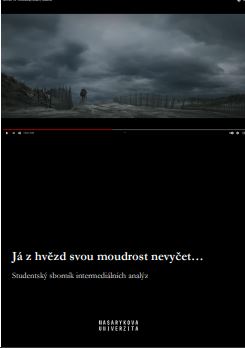Not from the stars do I my judgment pluck… Studentsʼ analytical papers on intermediality
Author(s): Author Not Specified / Language(s): English
/ Publication Year: 0
The volume consists of two parts, one of which comprises analyses of filmic transmediations of Shakespeare’s sonnets (The Sonnet Project, New York Shakespeare Exchange 2013, artistic director Ross Williams), the other analyses of literary ekphrases (by Wisława Szymborska, Ursula Fanthorpe, John Stone and others). It results from an Intermedial studies seminar held within the program Literature and Intercultural Communication at Masaryk University, Brno, in spring semester 2021. The original intention was to test the students’ competence in selecting and employing analytical tools and approaches, such as identifying transmedial structures and media specific means, taking into account genre and authorial poetics, as well as possible differences between the cultural context of literary pretext (or visual pre-representation in case of ekphrases) and the context that the transmediation process and the resulting media product are embedded in. Nevertheless, the students’ efforts led to a number of interesting interpretive outputs backed by further historical inquiry (e.g. into the history of the locations in New York where the films were shot), application of the system of modalities as introduced by Lars Elleström (e.g. while inquiring into the relation of temporality/timelessness in ekphrastic representations), explication of both visual and semantic effects of particular cinematic techniques, and establishing further intertextual relations. The interdisciplinary dimension of the intermedial analyses made it easier to detect the individual aspects of artistic re-interpretations of the original work. Thus, the contributions to the volume display various approaches that fall under two main (and historical in a sense) intermedial methods, that is, literature-centered (introduced by Werner Wolf), which focuses primarily on a semantic analysis of the original text, and literature-oriented (as suggested by Irina Rajewsky), which respects the transmediation as an autonomous representation and observes its relations to the pretext mainly retrospectively; , and even a comparative one, which involves a translinguistic analysis of translations as intercultural and historical transfers. Therefore, we offer our readers a fully fledged scholarly volume on transmediation, including methodological (self)reflections.
More...


